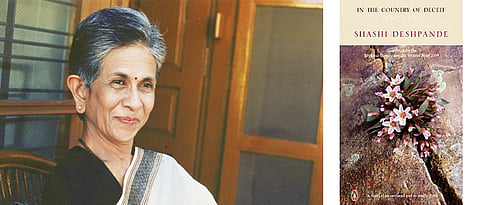

Love, loyalty and deception — the themes intersect each other in this story on adult love. Why did I do it? Why did I enter the country of deceit? What took me into it? I hesitate to use the word love, but what other word is there? In the Country of Deceit, Shashi Deshpande fleshes out the character of Devyani thus. She is a 30 something girl, who lives all by herself in the small town of Rajnur after the death of her parents.
Devyani builds a world of her own with gardening and taking up the job of teaching English to school students. Despite persistent efforts by family and friends who nudge her to get married and even introduce her to prospective grooms, Devyani decides to hold on to her independence. She pushes through loneliness and enjoys her solitude, which is interrupted sometimes with nostalgia for her childhood, the memories of her parents, siblings and school life. That is until she meets Ashok Chinappa and enters into an illicit relationship with him, as he is already married and father to a 10-year-old.
Deshpande has partitioned her narrative into four parts — Ground Zero, Epiphany, In the Country of Deceit and Unspooling. In the first part, Ground Zero, Devyani copes with the demolition of her ancestral house that is transformed into a modern structure. She says, Ground Zero, this is not an end but a beginning, a fresh start. In the next part she meets her lover and experiences the epiphany of love. The meeting of Devyani and Ashok is facilitated by a middle-aged actress Rani at her house. After a few days, Ashok offers Devyani a proposal offering her nothing in life. The book’s protagonist accepts the offer and plunges into ‘The Country of Deceit’. I had entered the country of deceit I could no longer be open and honest with the people I loved; I had to deceive them.
Unlike adolescent love, the relationship between Ashok and Devyani is a more mature one. Devyani rebels against the traditional way of life but carefully weighs the pros and cons before she enters into the illicit relationship with Ashok. Many clandestine meets take place in hotels and later at her house. While she enjoys the endearments of Ashok, she knows deep within her that it is after all an adulterous affair and thus has to be always filled with guilt.
Devyani is truly the soul of the book, other characters only help to flesh out her character assisting in the evolution of her personality. A series of letters written to Devyani is also another facet of the book.
Meanwhile, gradually, painfully Devyani develops an understanding of her relationship with Ashok, which will not receive sanction from him. After she reveals her affair to her sister, she breaks off but cannot stay away from him. But gradually, Devyani turns into Divyani and into Divya and decides to end the relationship. Her love for Ashok does not dim, she worships him but knows that it won’t be acceptable to society.
The final lines of Devyani, who returns to loneliness after the exit of Ashok from her life are: No, I don’t want to forget, I want to remember, it is not remembering, but forgetting that will be my greatest enemy like from now on a constant struggle between trying to forget and wanting to remember?
The novel, insightful and deep, filled with references from mythology including Mahabharat and the Marathi shloka, however drags along in a slow pace. The supporting cast of characters could have been fleshed out better to provide a more interesting read.
